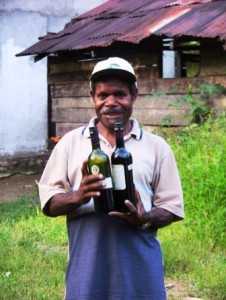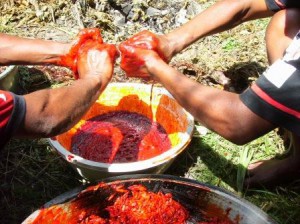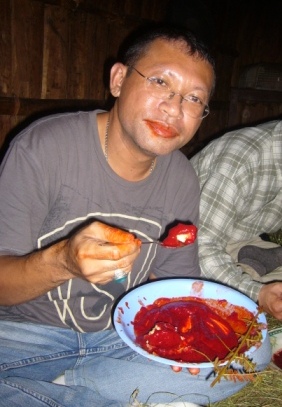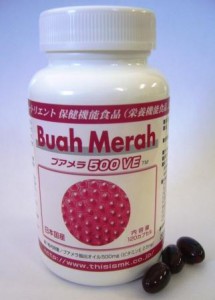
Category: beta-Cryptoxanthin >Buah Merah >Buah Merah 500 >English >Indonesia >lung cancer >Papua
Buah Merah and Papuan People
by Mathelda Kurniaty Roreng, S.TP, M.Si
and Toshiaki Nishigaki, Ph.D
How is Buah Merah cooked ?
There are some varieties in Buah Merah inclusive of short-, medium- or long-sized ones.
In the highland of Baliem valley, the local Papuans cultivate and utilize the most economical and nutritious long-sized fruits.
Now, the dwellers living in lowland areas transferred Buah Merah trees from the highlands and plant them.
However, it is believed that the fruits grown at highlands of Baliem valley and its vicinity are best in terms of nutrition because of climates.
The temperatures in the highlands are 14 to 28 ℃ in lowest and highest averages, and it rains slightly compared to the lowlands (7).
The highland people collect Buah Merah fruit whenever the fruit is matured.
The fruit is harvested two times a year. Harvesting time varies from areas to areas.
Therefore, they are able to take Buah Merah almost all the year around.
The Buah Merah fruits are cooked in their traditional way to make Pasta source.
It is said that the excess Pasta is stored in a bamboo container and used for one year.
Nowadays, the Pasta or extract oil is kept in a glass bottle.

Buah Merah pasta/oil in glass bottles
Papuan authentic cooking recipe, Bakar Batsu
The Pasta is ingested with steamed and/or roasted sweet potato, taro or vegetables.
The pig is very important domesticated animal and valuable as only source of animal food for native Papuan folks.
In a few occasion such as marriage and special ceremonies, pig is cooked with their traditional cooking way, Bakar Batu in Papuan language, cooking with burned stones.
This cooking method might be spread to Polynesia from Papua or Melanesia.
Stones are burned with fire
Burned stones are placed inside grass-made oven
Sweet potatoes and vegetables in hot oven
Pig meats are cooked at most outer layer
In Bakar Batu, the heated stones are placed between each food material and they are not directly attached to the food materials by putting glasses between the stones and food materials.
Buah Merah fruit is placed at the lowest layer, and pig meat at the outset layer.
After the flesh of Buah Merah fruit is heated with hot stones, it is separated from underlying fibrous layer and then water is put in the flesh.
The flesh is vigorously mixed and squeezed with hands to separate the fruit meats from seeds and obtain the Pasta.
The Pasta is a mixture of Buah Merah oil and cellular matrices.
The Pasta is used as source for cooked meat, potatoes and vegetables.
Cooked Buah Merah flesh is mixed with water

Pasta is made by squeezing the mixture
Buah Merah oil is obtained with Pasta

Pasta is used as source for cooked foods
References
1 R Otsuka. Earth of Mongoloids (2) Encounter to South Pacific Ocean (in Japanese), Tokyo University Publication, Japan, 1997
2 N Fukui et al. What is Human History vol. 20 (in Japanese), Kodansha, Japan, 2009
3 K Muller. Introducing Papua. Daisy World Books, Indonesia, 2008
4 J Pasveer. Prehistric Human Presence in Papua and Adjacent Areas, The Ecology of Indonesia Series vol. VI : The Ecology of Papua Part One, by AJ Marshall and B M Beehler. Periplus Editions (HK), edited. Singapore, 2007
5 T Nishigaki and K Nakashima. Buah Merah (in Japanese), Ikuhosha, Japan, 2007
6 T M Nishigaki and I S Waspodo. Buah Merah (in Indonesian), Yayasan Pengusaha Makanan dan Minuman Seluruh Indonesia, Indonesia, 2007
7 The Division of Balance Sheet of Regional and Cross-Sector Anakysis. Papua in Figure 2011, BPS-Statistics of Papua Province
8 RJ Johns, GA Shea, W Vink and O Puradyatmika. Montane Vegetation of Papua, The Ecology of Indonesia Series vol. VI : The Ecology of Papua Part Two, edited by AJ Marshall and B M Beehler. Periplus Editions (HK),. Singapore, 2007
9 Internal Archives of M&K Laboratories Inc. Japan
10 T Nishigaki, F N A Dewi, H Wijaya and H Shigematsu. Acute and Subacute Toxicity Studies of Pandanus conoideus (Buah Merah) Extract Oil in Sprague Dawley Rats. Internal Archives of M&K Laboratories Inc. Japan
11 T Maeda, H Miyakita, M Goto and A Ito. Mutagenicity Study (of Buah Merah Oil Made by PT Papua Herbal Sejahtera, Indonesia), Internal Archives of M&K Laboratories Inc. Japan
12 Micronutrient Information Center, Linus Pauling Institute, Oregon State University. http://lpi.oregonstate.edu/infocenter/phytochemicals/carotenoids/index.html#biological_activity
13 Redaksi trubus. Panduan Praktis BUAH MERAH (in Indonesian), 2005, Penebar Swadaya, Indonesia.
14 H Wijaya and T Nishigaki. Preliminary Pharmacokinetic Study of Buah Merah oil in healthy humans. Internal Archives of Center for Agro-Based Industry, Ministry of Industry, Indonesia
15 Institute of Medicine. Dietary reference intakes for vitamin A, vitamin K, arsenic, boron, chromium, copper, iodine, iron, manganese, molybdenum, nickel, sikicon, vanadium and zinc. 2001, National Academy Press, USA
16 T Tanaka et al. Suppression of Azoxymethane0induced colon carcinogenesis on male F344 rats by Mandarin juice rich in b-Cryptoxanthin and Hesperidin. Int. J. Cancer: 88, 146–150 (2000)
17 C Liu, RT Bronson, RM Russel and XD Wang. β-Ctryptoxanthin supplementation prevents cigarette smoke-induced lung inflammation, oxidative damage and squamous metaplasia in ferrets. Cancer Prev Res, Published online March 18, 2011
18 S Uchiyama, T Sumida and M Yamaguchi. Oral Administration of β -Cryptoxanthin Induces Anabolic Effects on Bone Components in the Femoral Tissues of Rats in Vivo. Biol. Pharm. Bull. : 27(2) 232—235 (2004)
19 Winarto, M Madiyan and N Anisah. The effect of Pandanus conoideus Lam. Oil on pancreatic β-cells and glibenclamide hupoglycemic effect of diabetic Wistar rats. Berkala Ilmu Kedokteran: 41 (1) 11-19, 2009
20 IM Budi and F Paimin, Buah Merah (in Indonesian), Penebar Swadaya, Indonesia, 2004
21 M Yahya and BTW Wiryanta. Khasiat & Manfaat Buah Merah (in Indonesia). AgroMedia Pustaka, Indonesia, 2005
22 Redaksi AgroMedia. Pro & Kontra Buah Merah. AgroMedia Pustaka, 2005
23 T Nishigaki, K Hirose, IS. Surono and H Shigematsu. Antitumor Effects of Pandanus conoideus in in vitro and in vivo Studies. Internal Archives of M&K Laboratories Inc. Japan
24 T Nishigaki and K Hirose. In vivo-growth inhibition of human gastric cancer K-MK-6 by Buah Merah. Internal Archives of M&K Laboratories Inc. Japan
25 H Yoshitomi, T Nishigaki, I Surono and M Gao. Longevity of Spontaneous Hypertensive Rat-Stroke Prone Rats (SHR-SP) by Morinda citrifolia (Noni) fruit juice, Cocos nucifera (Extra Virgin Coconut Oil ) and Pandanus conoideus (Buah Merah) oil. International Conference, Exhibition and Short Course on Nutraceuticals and Functional Foods in Indonesia, October 11-15, 2010
26 M Hatai, H Yoshitomi, T Nishigakiand M Gao. Inhibitory Effects and Mechanism of Buah Merah (Pandanus conoideus) Oil on Melanogenesis. Japan Pharmacy Conference, supposedly held in Shizuoka in April, 2011. Buah Merah Meeting in Tokyo, May 15, 2011
27 M Hatai, H Yoshitomi, T Nishigakiand M Gao. Stimulatory Action of Tyrosinase Degradation by Buah Merah Oil. Japan Pharmacy conference, March, 2012
28 F Lian, KQ Hu, RM Russel, XD Wang. 2006. beta-Cryptoxanthin suppresses the growth of immortalized human bronchial epithelial cells and non-small lung cancer cells and up-regulates retinoic acid receptor beta expression. 2006, Int. J. Cancer. 119:2084-2089.
Buah Merah 500VE is typical Buah Merah oil capsule product launched in Japan.

As of now, Buah Merah 500 /500VE capsule products have not been available
in any other country except Japan.
We are willing to send Buah Merah 500VE on request of readers from any country.
It is said that you can purchase food supplements for your self consumption without permission of authority.
Three (3) bottles of Buah Merah 500VE are ready to send you by EMS.
The price including EMS charge is USD 180.
Remittance cost is considered to be minimal.
Buah Merah 500VE is good for
fanatic smokers, patients with cancers, DM, post-menopausal oesteoporosis,
acne, boldness, malnutrition and other serious diseases,
and for enhance of your health, longevity.
Please contact, Dr. M. Nishigaki,
buahmerah@po.mcci.or.jp